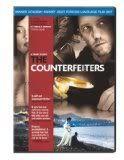
September 10, 2008
Der Fälscher "The Counterfeiters" (2007)
Yes, it won an Oscar for Best Foreign Language Film, but it didn't deserve it.
This is not a horrible film, the problem is that it is not a great one. The film tells the true story of master counterfeiter Salomon 'Sally' Sorowitsch (Karl Markovics) who is forced to oversee the largest counterfeiting operation in history run by the Nazis. Sally is plucked from the crowds of a concentration camp when his talents become useful to his captors. The Nazis design to flood England with counterfeit pounds and dragging their economy down.
The film concentrates on the counterfeiters working to create the fake currency while also battling amongst themselves whether they should sabotage the project or go along to survive. To bring this struggle to life, Sally, who is a self-serving criminal looking merely to survive, is constantly confronted by fellow prisoner Adolf Burger. Burger, a communist, demands that they sabotage the whole project even at the expense of their lives. Burger is a revolutionary who denies his fellow prisoner's right to life to feed his blind desire to hurt his tormentors.
The film suffers in two different places. First Burger, portrayed by August Diehl, is a detestable character. His calls for revolution and sacrifice come at a cost, not paid by him but by those around him. Diehl's bombastic performance is grating and sophmoric in light of Markovics' nuanced work. Diehl isn't necessarily to blame, Burger as a character is bluntly written and his dialog is nearly all platitudes. It is uncommon for the character to discuss anything that makes him human rather than a tool for director/screenwriter Stefan Ruzowitzky to hammer his point home.
The other area of concern is the focus of the film. The movie opens with Sally as a criminal counterfeiter. This part is interesting and does well to establish character. Then Sally is captured and sent to the camps. From that point the film becomes a relatively predictable paint-by-numbers Holocaust film. We get a glimpse at the dank barracks, the prisoners are consumed by disease and the violent whims of the guards. There's the stock guard who is particularly vile and cruel. The prisoners bond together and survive to play through the traditional rescue scene where they wander in bewildered amazement that it's really and finally over. I understand that we're all supposed to be reverent and offer blind approval for films about the Holocaust but the fact is that the Holocaust Movie has become subgenre with identifiable conventions. This film offers nothing new on these conventions. Where the real interest for the film, where the real character development occurs is after Sally survives the camps and is living large off his counterfeited money. The final scenes of the film show this part of his life. The torment of survivor's guilt, in particular in light of his helping the enemy is rich terrotory for a writer. If the film would have mined this, the story would have a devastating character study. As it stands, this is pedestrian stuff that we've seen a dozen times before.
Related Reviews:
Movies about Nazi Germany
Downfall (2004)
The Goebbels Experiment (2005)
Other Critic's Reviews:
Combustible Celluloid
Monsters & Critics
Labels: film, holocaust, Karl Markovics, movie review
Share
Previous Posts




Good News Film Reviews LLC 2004-2010 - used with permission
Images, video and titles are the property of their respective copyright holders. Good News Film Reviews LLC claims no ownership or connection to them.
The views expressed on this site are not the opinion of any advertiser or external entity.
While we take care to only link to responsible entities, Good News Film Reviews LLC takes no responsibility for the content linked from this site. There are sharks in the waters. Surf at your own risk.
The Template is generated via PsycHo and is Licensed.






















0 Comments:
Post a Comment
<< Home